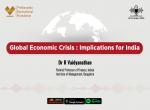In a landmark decision, the Indian Government has given a green signal to the ambitious project of turning 100 urban centres spread across the country into smart cities ,the need for which has been vigorously espoused by the tech savy Indian Prime Minister Narendra Modi .The “Smart Cities Mission” that will attract an investment of Rs.480,000-million has as its objective, “recasting the urban landscape of the country by making cities more liveable and inclusive, besides driving economic growth”. As envisaged now, a special purpose vehicle(SPV) will be put in place for giving a practical shape to the “smart city” action plan and as per the decision of the Indian Government, each city identified for development into a smart city will receive a financial assistance to the tune of Rs.1000-million a year over the next five years. In fact, the proposal for the creation of 100 smart cities was first mooted in India’s national budget presented in July 2014. According to sources in the Urban Development Ministry ,it is up to the states to decide on the design and configuration of smart cities based on the ”localised needs”-As it is, individual states will come out with a list of the potential urban centres for development into smart cities. It is also expected that the individual states will fall back on Public Private Partnership Model to help the urban bodies to mobilize the funds required for building smart cities.
Not surprisingly then Indian realty companies have whole-heartedly welcomed the proposal to develop smart cities with the observation that it would provide the right fillip to urban regeneration. At about the same time, many urban design experts have highlighted the need for incorporating safety features into the DNA of Smart Cities. They are all of view that the security aspect of a smart city needs to be prioritised and accorded utmost importance. But then there is no standard definition to describe what really constitutes a smart city. Fortunately, there is an unanimity of the view that a smart city should be intelligent enough to help its citizens lead a comfortable and hassle free life. As pointed out by Sunita Narain, Director of the New Delhi based Centre for Science and Environment (CSE), a smart city can be seen as a settlement where technology is used to bring about efficiency in resources use and improvement in the level of services. There is no denying the point that a smart city should be free from transport bottlenecks, overcrowding, shortage of power and water and infrastructural deficiencies. More importantly, smart cities should devise an eco friendly and innovative system to handle and dispose off garbage and urban waste which can also be a source of energy generation. In the ultimate analysis, a smart city should help enrich the quality of life of its inhabitants.
In a smart city environment, citizens would need to cultivate the habit of actively participating in the life of the community. For they are stakeholders in the successful implementation of the schemes to enhance the smartness of the cities they inhabit. Of course only smart inhabitants could facilitate smart governance while helping attract investments to sustain the innovative growth of the cities.As things stand now, smart cities appear to be the best and timely solution for the challenging problems of chaotic urbanisation. Far from being a choice, smart cities are the crying need of the hour. Indeed, smart city is an idea whose time has come.
Meanwhile, in a development of significance, a research study by the Dalberg Global Development Advisors, a strategy and policy consulting firm ,has revealed that the use of smart maps for developing 100 smart cities in India could help the country save US$8-billion in addition to reduction in carbon emissions to the extent of one million tonne a year. The report from the firm captioned “Smart Maps for Smart Cities” points out that India was expected to witness high migration to cities over the next three decades with over 400-million new inhabitants moving into urban centres. ”The expansion of India’s urban population will also have to be met with an expansion of infrastructure that is 20 times the capacity that has been added to India’s cities over the last decade,” said the report. According to Pritha Venkatachalam, principal at Dalberg Global Development Advisors “Surveys show that emergency vehicles in India spend about 25 per cent of their response time or one fourth of their time to reach their patient or beneficiary. And that time is spent in looking at the exact location from where the call originated. A use of smart maps can reduce that time to 2-3 minutes which is our conservative estimate and save 13,000-lives”.
Each smart city should zero in on the technological tools that could enhance its smartness and enrich the lives of its inhabitants with a data driven administration enabling the city manage its resources efficiently and effectively. Of course, pilot projects should precede the action plan for implementing smart city strategies. By all means, a smart city should integrate its critical infrastructure and optimally utilise its resources with a focus on ensuring “an improved quality of life “for its citizens. According to Kishor Patil, Managing Director and Chief Executive Officer(CEO)of KPIT Cummins Info Systems the plan to build smart cities will facilitate development of digital technology to provide efficient solutions for urban transportation, traffic management and even electricity and water supply. Smart cities will also boast of a smart economy that would help allocate resources in a judicious and balanced manner for civic amenities and infrastructure development.
However the biggest question that nags the planners spearheading the development of smart cities is how to generate massive volume of energy required to keep these cities “ticking and active” .As pointed out by Sagar Dhara an expert on energetics and risk issues, urban development Minister Venkiah Naidu should share his energy costing and supply analysis for the proposed 100 new smart cities. A eco friendly and cost efficient energy generation and distribution system alone could keep a smart city “green and clean”. Another striking feature of the smart city will be its e-governance mechanism.
All said and done, the smart city project being spearheaded by India should take cognizance of the ground reality that in the none too distant a future, a large number of Indians will be living in the urban areas of the country. Currently, about one third of the Indians live in cities. Meanwhile, Naidu has driven home the point that through smart city project Prime Minister Modi wants to take big city living to a new level where 24/7 utility services becomes an essential part of the public service delivery.
The conspicuous aspect of the plan for 100 smart cities is that they will be designed and built as satellite towns of larger cities and an answer to the ills afflicting Indian metros. According to Debolina Kundu, Associate Professor at the National Institute of Urban Affairs, “All these years, we were looking only at big cities, and there was a bias towards them. It is very encouraging for urban India to get a facelift through the development of smart cities”. By all means, Smart Cities, should stress strongly on leveraging technology to boost basic amenities and service delivery and enhance the quality of life through the optimal exploitation of available resources. But then the smart cities could by no means a magic wand to mitigate the urban ills over night. As stated by the Urban Development Minister Venkaiah Naidu, smart cities project is a long term plan and expecting results overnight will be immature . He has indicated a larger, dominant role for the states in the Smart City project with the Centre playing a supporting role. At the end of the day, investor friendly smart cities could contribute in a big way to the economic resurgence in the country.
A number of countries have offered their expertise and assistance to India’s endeavour of realizing 100 smart cities. The latest t offer help to develop smart cities is Spain. In this context, Foreign Affairs Minister of Spain Jose Manuel Garcia Margallo had sometime back held discussion with Venkaiah Naidu and presented a draft plan and memorandum of understanding(MOU) to develop smart cities in the country with the Capital region of Delhi serving as the hub. In particular Spain has offered to make available its expertise in developing transportation networks ,water resources management, waste disposal and renewable energy generation.
Digitally robust and intelligent smart cities can make life comfortable and enjoyable for its inhabitants by easier access to services and utilities. Affordable health care, comfortable housing, efficient public transport network and a robust infrastructure support system could make a Smart City living an eminently enjoyable experience for its citizens.
Published Date: 22nd June 2015, Image Source: https://en.wikipedia.org
(Disclaimer: The views and opinions expressed in this article are those of the author and do not necessarily reflect the official policy or position of the Vivekananda International Foundation)








Post new comment